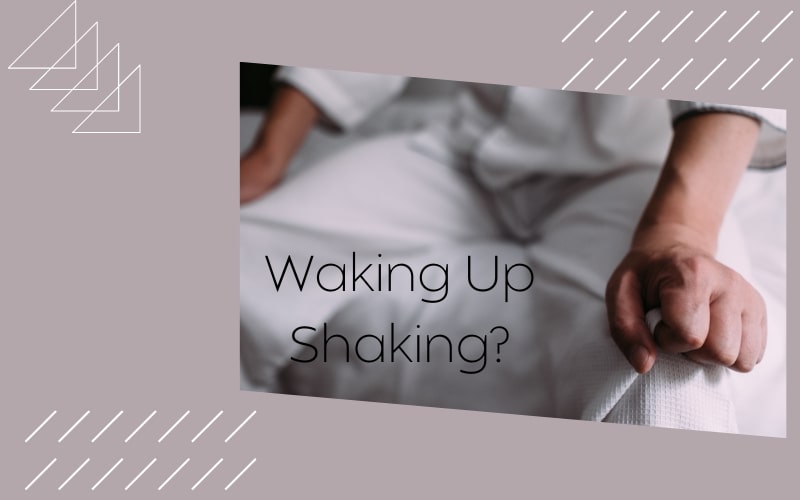Experiencing a shaking sensation upon awakening can be a disconcerting and sometimes even a terrifying experience. While it could be indicative of a serious health condition such as Parkinson’s disease or a seizure, in many instances, the root cause remains elusive and is not linked to any underlying medical condition.
People often describe this sensation as a tremor or vibration coursing through their body, accompanied by feelings of dizziness or lightheadedness. Some individuals may also report a racing heart, even if their pulse rate remains within normal limits. The duration of these shaking episodes can vary, lasting from a few seconds to several minutes.
In this article, we delve into the possible reasons behind waking up shaking and explore potential treatments and natural remedies that could help. With the right diagnosis and treatment plan from your healthcare provider, it is possible to conquer this issue and enjoy a peaceful night’s sleep.
Disclaimer: Always consult with a healthcare provider if you have any questions or before starting any new supplement. This article is intended for informational purposes only, based on third-party research. It does not constitute medical advice.
Most Common Symptoms Include:
Tremors

Tremors are involuntary, rhythmic muscle contractions that can affect the hands, arms, legs, and face. The trembling typically starts in one area, such as a hand or foot, and gradually spreads to other parts of the body. The duration of the shaking can vary, lasting from a few seconds to several minutes.
Sweating
Excessive sweating or profuse perspiration can also accompany waking up shaking. It’s not uncommon to wake up with damp sheets or clothing.
While sweating is typically a response to anxiety or fear and not a medical condition, it’s advisable to consult your doctor if you experience prolonged episodes of excessive sweating.
Anxiety & Panic Attacks
If anxiety or fear triggers waking up shaking, it can lead to panic attacks or feelings of dread. In some cases, the individual may experience confusion and difficulty concentrating.
Panic attacks often come with shortness of breath, chest pain, and an overwhelming sense of fear. If you frequently experience panic attacks, it’s crucial to consult with your healthcare provider.
Rapid Breathing

In some instances, waking up shaking can be accompanied by rapid breathing or hyperventilation. This breathlessness can make the experience even more overwhelming and frightening.
You may also notice an increased heart rate and feelings of lightheadedness or dizziness. If this happens, taking deep, calming breaths is crucial.
Nausea, Vomiting & Headaches
Nausea, vomiting, and headaches are common symptoms associated with waking up shaking. In some cases, nausea can be severe enough to cause vomiting or a headache that is difficult to manage.
If you experience any of these symptoms in addition to waking up shaking, it’s crucial to consult with your healthcare provider as soon as possible.
Causes of Waking up Shaking
The causes of waking up shaking can vary greatly, ranging from physical to psychological conditions. Common physical causes include:
Low Blood Sugar

Low blood sugar, often seen in individuals with diabetes, can cause shaking or trembling upon waking. These individuals may need to consume a snack or a sugary drink to counteract the low blood sugar. Skipping meals or eating late at night can also cause low blood sugar. However, most times, it’s simply a result of eating less throughout the day.
Sleep Deprivation
Sleep deprivation can lead to shaking or trembling upon waking due to its impact on the body’s nervous system. This can occur in individuals who do not get enough sleep each night or those who oversleep and wake up feeling groggy and shaky.
The connection between sleep and shaking is not fully understood, but many individuals report waking up feeling shaky.
Medication Side Effects

Certain medications can cause shaking or trembling due to their impact on the body’s nervous system. In some cases, this is a common side effect of the medication and should fade over time.
In other cases, it may be necessary to switch medications to reduce the shaking response. Always consult with a doctor before making any changes to your medication regimen.
Stress or Anxiety
Stress and anxiety can lead to trembling or shaking upon waking due to the body’s response to these emotions. This is often seen in individuals with mental health conditions such as depression or post-traumatic stress disorder.
Additionally, people who experience frequent bouts of stress or anxiety may also find themselves shaking when they wake up. The best way to address this type of shaking is to reduce overall stress or anxiety levels as much as possible through relaxation techniques, counseling, and other methods.
Nutrient Deficiency

Deficiencies in nutrients, such as magnesium or calcium, can cause shaking upon waking. This is typically caused by an inadequate diet and can be addressed by consuming foods rich in the necessary vitamins and minerals.
If the nutrient deficiency persists after making dietary changes, taking a vitamin or mineral supplement may be necessary to restore the body’s balance – consult your doctor for advice.
Other Conditions
Other conditions, such as thyroid disorders, can cause shaking or trembling upon waking. It’s crucial to consult with a doctor if this shaking persists to rule out any underlying medical issues.
In conclusion, waking up shaking can have many causes, ranging from physical to psychological conditions. Identifying and addressing the underlying cause is crucial to stop the shaking response. Consulting with a doctor can help individuals better understand their condition and determine the best course of action.
Top 8 Solutions
The most effective treatment for waking up shaking will depend on the underlying cause. Here are the most common treatments:
Cognitive Behavioral Therapy (CBT)
CBT is a type of psychotherapy that helps individuals alter their thought patterns and behaviors to alleviate symptoms of anxiety, depression, and other mental health issues. With this treatment, the therapist assists the individual in identifying any underlying issues or triggers and developing strategies for managing these thoughts and feelings.
Medication
The doctor may prescribe anti-anxiety medications, antidepressants, or anticonvulsants to help manage the symptoms of waking up shaking. The specific medication prescribed will depend on the individual’s symptoms and underlying medical condition.
Counseling
Engaging in conversations with a professional counselor or therapist can also benefit individuals experiencing episodes of waking up shaking. A counselor or therapist can provide support and guidance during times of distress and help the individual develop strategies for managing their symptoms.
Relaxation Techniques
Relaxation techniques can help reduce stress and anxiety levels, which in turn can help reduce episodes of waking up shaking. These techniques include deep breathing, progressive muscle relaxation, and visualization exercises.
Health experts often recommend relaxation techniques as the best treatment for individuals experiencing waking up shaking due to anxiety or fear.
Supplements
Certain supplements, such as magnesium and vitamin B12, can also help reduce episodes of waking up shaking. However, it’s essential to consult with your doctor or healthcare professional before starting any supplement regimen.
Sleep Hygiene
Adopting healthy sleep habits can help reduce episodes of waking up shaking. This includes ensuring adequate sleep, avoiding caffeine and alcohol late at night, limiting screen time at night, and establishing a relaxing bedtime routine.
Implementing such sleep hygiene practices can help reduce stress and anxiety levels, which in turn can help alleviate episodes of waking up shaking.
Lifestyle Changes

Making specific lifestyle changes can also benefit individuals experiencing episodes of waking up shaking. These changes include reducing caffeine and alcohol intake, managing stress levels, and engaging in relaxing activities such as yoga or meditation.
Exercise
Regular physical activity can help reduce stress and tension levels, which in turn can help reduce episodes of waking up shaking. Exercise also releases endorphins, which act as natural mood boosters.
Active individuals tend to experience fewer symptoms of stress, tension, and anxiety. A study conducted by Harvard Medical School showed that individuals who exercise regularly experienced a decrease in symptoms of anxiety and depression.
Top 9 Natural Remedies that May Help
Physical Activity
Engage in light physical activity to relieve stress, reduce anxiety, and boost your energy levels. Consider taking a brisk walk, running, or practicing yoga in the morning. Even a few minutes of stretching or dancing can provide enough energy to start the day without feeling shaky or anxious.
Chamomile Tea
Chamomile tea is a fantastic natural remedy for morning shakes. It has a calming effect that can soothe your nerves and provide the energy needed to get through the day. Consider drinking a cup of chamomile tea before bed or whenever you feel nervous.
Aromatherapy

Aromatherapy can help relax and calm your nerves. Consider using essential oils such as lavender, geranium, or jasmine to help soothe your body and mind in the morning. You can add these oils to your bathwater or use them during meditation.
Meditation
Take a few minutes each morning to meditate. Meditation can help you relax and clear your mind, allowing you to focus on the day ahead without feeling overwhelmed or anxious. Concentrate on your breathing and take deep breaths to calm your body.
Herbal Supplements
Herbal supplements such as valerian, passionflower, and chamomile can help reduce stress and anxiety levels. Taking these supplements before bedtime can help promote sound sleep and reduce the likelihood of waking up shaking.
Positive Affirmations
Start your day with positive affirmations. Repeat positive phrases such as “I am strong,” “I can achieve anything I set my mind to,” or “I am capable of accomplishing great things.” This practice can help shift your mindset from anxious and shaky to focused and determined.
Music

Create a playlist of soothing, calming music and listen to it in the morning. Instead of focusing on your anxieties or shaking, concentrate on the music and allow it to bring peace to your body.
Get Enough Sleep
Ensure you get enough sleep at night to avoid feeling exhausted in the morning. Aim for 7-8 hours of sleep every night and try to maintain a consistent bedtime.
Talk To Someone
Don’t hesitate to talk to someone if you’re struggling with shaking or anxiety. Conversations can help ease your mind and make managing anxiety easier.
These natural remedies can help reduce or eliminate morning shakes and alleviate the effects of anxiety. Try incorporating these into your daily routine for improved mental health and a more productive day.
FAQs
Why do I shake when I wake up in the morning?
The exact cause of waking up shaking can be unclear, with multiple factors potentially contributing to the experience. It may be related to anxiety or stress, sleep deprivation, or even physical exercise before bedtime. It could also be due to low blood sugar levels in individuals with diabetes or an adverse reaction to certain medications.
Why do I feel weak and shaky after waking up?
Feeling weak and shaky after waking up is usually indicative of fatigue. You may need more restful sleep or be dehydrated, leading to low energy levels. Other potential causes may include hormonal imbalances, vitamin deficiencies, or medical conditions such as hypoglycemia or diabetes.
Final Thoughts
Waking up shaking can be a distressing experience, but it’s crucial to identify and address the underlying cause to alleviate the shaking response. There are numerous potential causes, ranging from physical to psychological conditions, so consulting with a doctor can help individuals better understand their condition and determine the best course of action.
With the right diagnosis and treatment plan, it’s possible to overcome this issue and enjoy a good night’s sleep. This article has provided an overview of some potential causes of waking up shaking, such as low blood sugar, sleep deprivation, stress or anxiety, medication side effects, and nutrient deficiencies.
However, with the right diagnosis and treatment plan, it’s possible to overcome this issue and enjoy a good night’s sleep.

